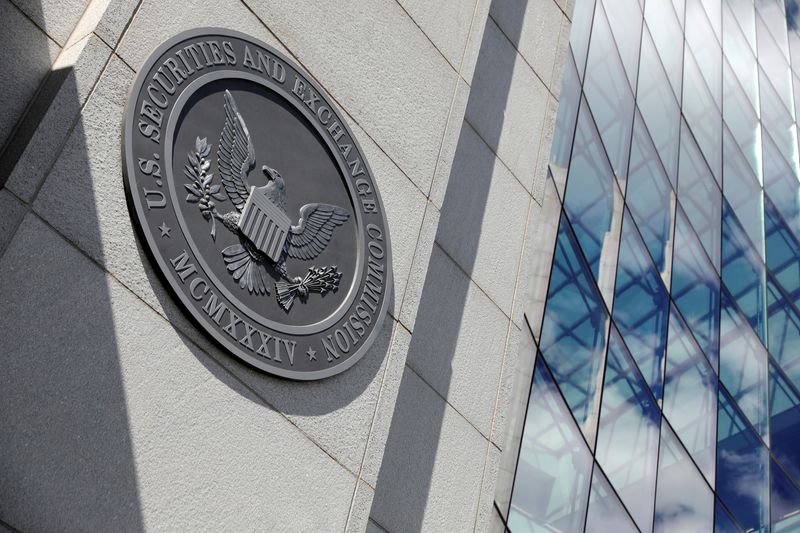Factbox-The SEC’s response to the ‘meme stock’ rally
2022.06.24 22:06

FILE PHOTO: The seal of the U.S. Securities and Exchange Commission (SEC) is seen at their headquarters in Washington, D.C., U.S., May 12, 2021. REUTERS/Andrew Kelly/File Photo
(Reuters) – A year-and-a-half after a “meme stock” rally roiled Wall Street, the U.S. Securities and Exchange Commission is considering broad changes to curb the frenetic trading of stocks based on social media activity.
The proposed overhaul would be the biggest change to Wall Street’s rules since 2005 and would affect nearly every corner of the market, from commission-free brokerages to market makers and exchanges.
The U.S. House Committee on Financial Services on Friday called for the SEC, along with other regulators, to do more to protect the markets from similar events.
The impetus for change came from the so-called “Reddit rally” of January 2021, in which GameStop Corp (NYSE:GME) and other “meme stocks” popular on social media surged to extreme highs on buying from investors trading heavily through Robinhood (NASDAQ:HOOD) and other commission-free retail brokerages.
The intense volatility led to big losses for hedge funds that had bet against the meme stocks.
It also led Robinhood and others to restrict trading in the affected securities, in turn curbing the rally, infuriating retail investors and rattling market confidence.
Here are some of the issues the SEC is scrutinizing:
PAYMENT FOR ORDER FLOW
Gary Gensler, the SEC chief, has criticized payment for order flow (PFOF), a practice in which some commission-free brokers generate revenue by sending customer orders to wholesale market makers in return for payments, rather than to exchanges.
He has said a ban on the practice is not off the table as it raises potential conflicts of interest, giving brokers incentives to encourage customers to trade more frequently to maximize the payments.
The meme stock trading frenzy exposed concerns about the ways in which PFOF increases complexity and potential fragility in the securities markets, the House Financial Services Committee report said.
Proponents say PFOF is a major reason brokerages were able to stop charging trading commissions, and retail investors often get a lower, better price than they would on the main exchange.
DIGITAL TRADING PROMPTS
Gensler has criticized the “gamification of trading” in which commission-free brokerages encourage excessive trading using lights, noises, notifications and other gimmicks to generate more PFOF.
He has also highlighted the use of artificial intelligence, predictive data analytics and machine learning to push products.
In August https://www.reuters.com/legal/transactional/us-markets-regulator-wants-public-feedback-firms-digital-engagement-practices-2021-08-27 2021, the SEC issued a consultation on potential new rules to limit gamification and other “digital engagement prompts.” The agency is expected to proceed with a rule change https://www.reuters.com/business/finance/will-games-stop-sec-mulls-crackdown-trading-apps-2022-01-26 in the coming months.
The U.S. House Financial Services Committee on Friday urged Congress to adopt legislation mandating the SEC study how its rules need to change to address new technological developments, such as digital engagement practices and social media-driven market activity.
CONCENTRATION, PRICING
The GameStop saga highlighted the small number of market-makers — brokers that execute trades and publicly post buy and sell quotes for others to trade — that dominate the retail market, which may pose competition issues, Gensler has said.
The House Financial Services Committee said that at the time of the Reddit rally, Robinhood was not connected to any exchanges, and of the six market makers Robinhood routed all its customers’ orders to, nearly all were unable to execute trades in certain meme stocks due to the market stress.
“Had all these market makers been unable to execute trades, Robinhood would have been unable to execute trades on behalf of its customers,” the report said.
Nearly all retail trades are executed away from exchanges.
That is partly due to rules that allow market makers to offer fractional sub-penny price improvement on bids and offers, whereas exchanges have to quote in pennies.
Gensler has said that has created an uneven playing field in the competition for retail orders.
Gensler has asked SEC staff to recommend potential changes to harmonize the ability to display sub-penny quotes on and off exchange.








